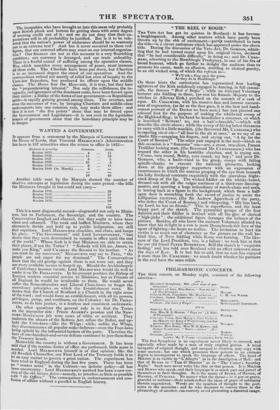WANTED A GOVERNMENT.
IT appears from a statement by the Marquis of LONDONDERRY to the House of Lords, that Viscount MELBOURNE'S Administration has been in 107 minorities since the return to office in 1835—
Ministers in minority. Commons. Lords.
Session 1835 4 ... 11 Session 1836 11 ... 18 Session 1837 5 Session 1838 21 4 Session 1839 8 ... 11 Session 1840 (to March) 58 49
Another table read by the Marquis showed the number of abortive attempts at legislation during the same period—the bills the Ministers brought in but could not carry—
Session 1836 29 Session 1837 21 Session 1838 34 Session 1839 28 112
This is a most disgraceful record—disgraceful not only to Minis- ters, but to Parliament, the Sovereign, and the country. The Conservatives laughed and cheered, but they ought to have been silent and ashamed. The weak and baffled Ministers, whom they alternately deride and hold up to public indignation, are still their superiors. Lord MELBOURNE chuckles, and chats, and keeps his place. "The Government," said Lord LONDONDERRY, "had shown that they were determined to remain in office until the end of the world." Whose fault is it that Ministers are able to retain their places, if not the Tories' ? "Nobody will kill me, James, to make you King," said CHARLES the Second to his brother. "As you must be my successor," MELBOURNE may say to PEEL, "the people are not eager for my dismissal." The Conservatives kuow that the old grudge against them is not worn out, and they use every available means to keep it up. Should the Archbishopric of Canterbury become vacant, Lord MELBOURNE would do well to confer it on Dr. PH11.1.POTTS. In his present position the Bishop of EXETER renders essential service to Ministers, but as Primate of all England he would be invaluable to them. He would never suffer the Nonconformists and Liberal Churchmen to forget the ascendancy principles on which the Establishment rests. He denies that the Church of Scotland is a Church in the right sense of the word ; and would force an establishment, with all its powers, privileges, pomp, and costliness, on the Colonies : for Dr. Puu.L- rorrs, to do him justice, is a fearless and consistent ecclesiastic.
On other questions the general rule is to find the Tories on the unpopular side : Prince ALBERT'S pension and the NEW.. POR.T-MONTEAGLE job were cases of whim or accident. They maintain the abuses of the Reform Act, refuse the Ballot, and up- hold the Corn-laws—like the Whigs ; while, unlike the Whigs, they discountenance all popular make-believes—even the Poor-laws being upheld by the influential leaders of the party. Therefore the hero of one-hundred-and-seven defeats continues to jeer them from the Treasury bench. .Meanwhile the country is without a Government. It has been said that if the routine duties of office are performed, little more is needed. Lord MELBOURNE himself is of that opinion : like the old Swedish Chancellor, our First Lord of the Treasury holds it to be an easy matter to govern a great nation. The experiment has been tried in England during the last five years. There has been no " master mind" in the Cabinet—no definite policy—all has been uncertainty : Lord MELBOURNE'S method has been a new ver- sip of the old laissez fire—namely, to interferc. as little as possible tad! " the Offices." The consequence is, embarrassment and con- fusion of affiurs without a parallel in English history.


























 Previous page
Previous page